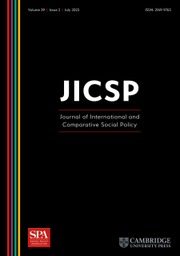Article contents
Whither development studies? Reflections on its relationship with social policy
Published online by Cambridge University Press: 09 March 2020
Abstract
This paper contributes to an ongoing conversation between development studies (DS) and social policy (SP) as academic fields, particularly in the UK. Using Andrew Abbott's analysis of the social sciences as an evolving system of knowledge lineages (KLs), it reflects on the status of DS and its relationship with SP. Defining DS as a distinctive KL centred on critical analysis of ideas and projects for advancing human well-being, I suggest that it has lost coherence even as research into international development thrives. Indeed it is easy to envisage its gradual assimilation into other KLs, including SP. The two increasingly overlap in their analysis of the causes of relative poverty and injustice, and what can be done to address them, within countries and globally. Strengthening links between the two fields can be justified as a political project, even at the risk of some loss of plurality and plenitude across the social sciences.
- Type
- Research Article
- Information
- Copyright
- Copyright © 2015 Taylor & Francis
References
- 7
- Cited by


